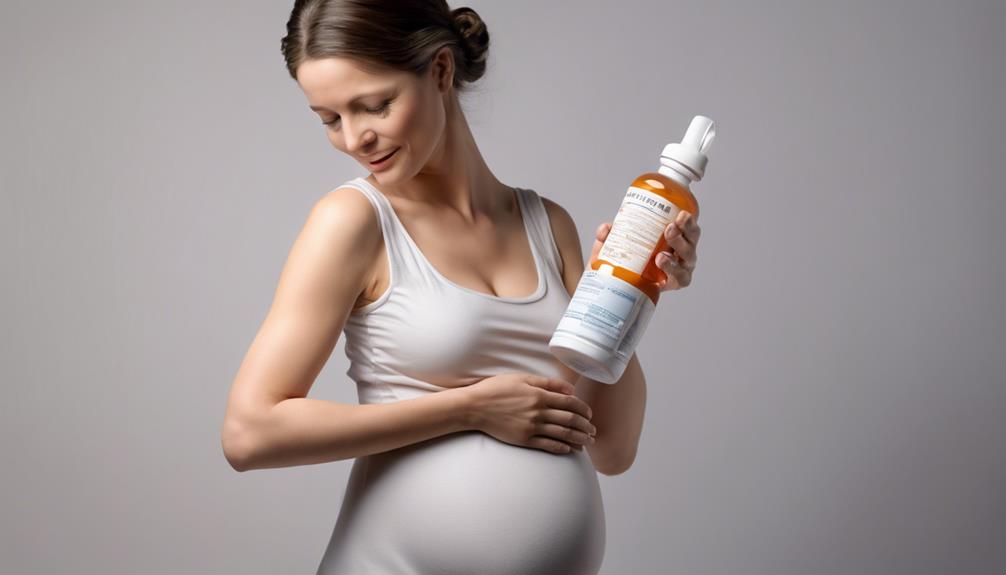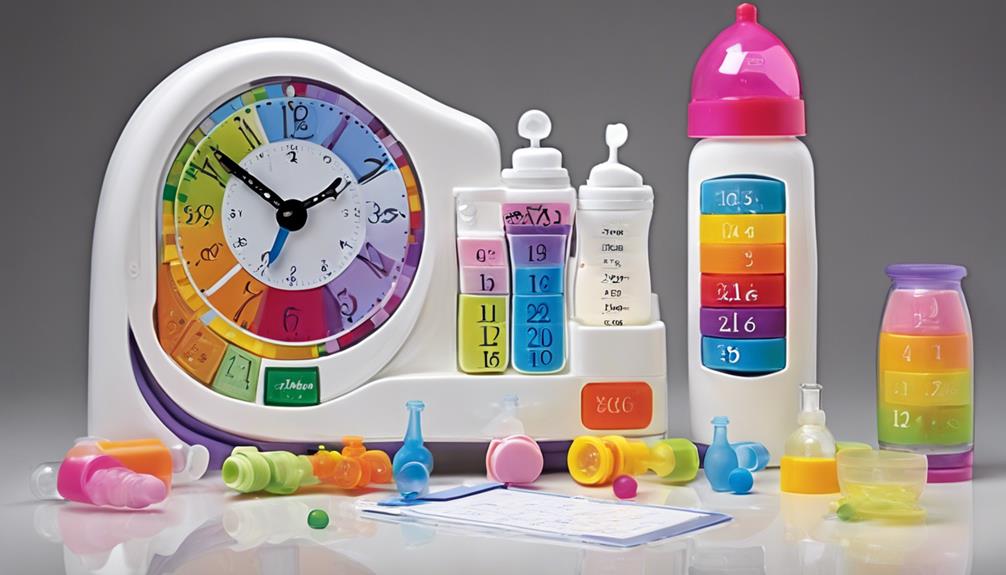Interested in learning about which allergy medications are considered safe to use during the second trimester of pregnancy? It is important to manage allergy symptoms during this crucial stage while keeping the health and well-being of both the mother and the unborn baby a top priority.
But what are the best choices? Let's explore practical and safe solutions that can offer relief without compromising the pregnancy.
Key Takeaways
- Antihistamine tablets like Loratadine and Cetirizine are safe options for allergy relief.
- Nasal steroid sprays such as Nasonex and Flonase are effective and recommended during pregnancy.
- Use decongestants cautiously, especially after the second trimester and with medical advice.
- Consult a healthcare provider for safe allergy medication choices and personalized guidance.
Safe Allergy Medications for Pregnancy
When managing allergies during pregnancy, it's essential to choose safe and effective medications recommended by healthcare providers. Antihistamine tablets such as Loratadine, Cetirizine, and Chlorpheniramine are generally considered essential for allergy relief during pregnancy. These medications can help alleviate symptoms like sneezing, itching, and watery eyes without posing significant risks to the developing fetus. Nasal steroid sprays like Nasonex, Nasacort, and Flonase are also deemed essential options for managing allergies in pregnant individuals. These sprays can help reduce nasal congestion and inflammation, providing relief without causing harm to the baby.
Decongestants, on the other hand, are generally not recommended during the first trimester but can be considered after the second trimester for allergy relief. It's essential to consult a healthcare provider before using decongestants, especially if there's a history of high blood pressure or other medical conditions. Allergy shots, while typically safe if initiated before pregnancy, are generally not recommended to start during pregnancy. Seeking guidance from a healthcare provider is essential to ensure the safest allergy medication options are chosen during the second trimester of pregnancy.
Allergy Relief Options in Second Trimester

During the second trimester of pregnancy, exploring safe and effective allergy relief options is important for expectant mothers. Here are some key considerations for managing allergies during this stage:
- Antihistamine Tablets: Options like Loratadine and Cetirizine are generally considered safe for allergy relief during the second trimester of pregnancy.
- Nasal Steroid Sprays: Nasal steroid sprays such as Nasonex and Flonase can be used at recommended dosages to manage allergy symptoms effectively.
- Decongestants: It's essential to use decongestants cautiously during the second trimester, especially if there are no underlying health conditions like high blood pressure.
- Consult Healthcare Provider: Consulting a healthcare provider is vital to determine the most appropriate and safe allergy relief options during the second trimester of pregnancy.
In addition to medication options, non-medication alternatives such as saline nasal sprays, humidifiers, and allergen-proof bedding can also help alleviate allergy symptoms safely during this stage of pregnancy.
Consultation with a healthcare provider can guide you in selecting the most suitable approach for your specific needs.
Managing Allergies Safely While Pregnant
To effectively manage allergies safely while pregnant, utilizing proven methods and safe practices is essential for expectant mothers. During the second trimester, when nasal congestion and allergies can be troublesome, safe options like saline nasal sprays can offer relief without posing risks to the pregnancy.
Engaging in physical exercise, under the guidance of a healthcare provider, is another vital way to alleviate allergy symptoms by improving circulation. Nasal strips are a non-medicated option that pregnant individuals can use to help keep their nasal passages open and facilitate easier breathing.
It's important to steer clear of allergy triggers and maintain a clean indoor environment to minimize symptoms during this sensitive time. Additionally, nasal irrigation with proper water can effectively flush out allergens and mucus, providing comfort and relief from allergy symptoms in a safe manner.
Pregnancy-Safe Allergy Medicine Choices

Considered safe options for managing allergies during the second trimester of pregnancy include antihistamine tablets like Loratadine, Cetirizine, and Chlorpheniramine. When seeking pregnancy-safe allergy relief, here are essential points to take into account:
- Antihistamine Tablets: Opt for Loratadine, Cetirizine, or Chlorpheniramine under healthcare provider guidance for effective symptom relief.
- Nasal Steroid Sprays: Take into account using Nasonex, Nasacort, or Flonase as they're generally safe for managing nasal allergy symptoms in the second trimester.
- Decongestants Caution: Exercise caution with decongestants, especially if there's a history of high blood pressure, and consult your healthcare provider before use.
- Recommended Dosages and Consultation: Always adhere to recommended dosages and consult your healthcare provider before starting any allergy medication during the second trimester to address individual needs and potential risks.
Prioritizing safety and seeking professional guidance can help make sure effective allergy management while safeguarding the well-being of both you and your baby.
Allergy Medication Guidelines for Expecting Mothers
Our recommended allergy medication guidelines for expecting mothers prioritize safety and effectiveness in managing symptoms during pregnancy's second trimester. When considering allergy relief options, consulting your healthcare provider for personalized guidance is crucial. Antihistamine tablets like Loratadine and Cetirizine are generally safe choices during this trimester. Nasal steroid sprays, such as Nasonex and Flonase, can also be used at recommended dosages to help alleviate allergy symptoms. However, decongestants should be avoided if you have high blood pressure during pregnancy, although they are considered safe after the second trimester. Allergy shots require careful evaluation during the second trimester, and decisions should be made in consultation with a healthcare provider. Prioritizing the safety of both you and your baby, these guidelines offer a range of safe options to manage allergies effectively during this critical stage of pregnancy.
| Allergy Medication Type | Safety in Second Trimester | Special Considerations |
|---|---|---|
| Antihistamines | Generally safe | – |
| Nasal Steroid Sprays | Recommended dosages | – |
| Decongestants | Avoid with high BP | Safe after 2nd trimester |
| Allergy Shots | Evaluate carefully | Consult healthcare provider |
Frequently Asked Questions
What Can I Take for Allergies While Pregnant Second Trimester?
We can safely manage allergies during the second trimester of pregnancy with antihistamine tablets like Loratadine and Cetirizine. Nasal steroid sprays such as Nasonex and Flonase are also recommended, but always consult a healthcare provider for guidance.
Which Antihistamine Is Safe in Second Trimester?
In the second trimester of pregnancy, loratadine (Claritin) is a safe antihistamine option for allergies. Studies show it doesn't increase risks to the baby. Always consult healthcare providers and follow recommended dosages.
Is Zyrtec Safe During Pregnancy Second Trimester?
Yes, Zyrtec is generally safe during the second trimester of pregnancy. Research indicates no increased risk of birth defects with cetirizine use. Consult a healthcare provider before taking any allergy medication while pregnant.
Is Claritin or Zyrtec Safe for Pregnancy?
Absolutely! Both Claritin and Zyrtec are safe options during pregnancy. Research supports their use in the second trimester. Always consult your healthcare provider before taking any medication while pregnant for personalized advice.
Conclusion
As we navigate the second trimester of pregnancy, it's essential to prioritize both our health and the well-being of our little ones. By choosing safe allergy medications like Allegra, Benadryl, Claritin, or Zyrtec under the guidance of a healthcare provider, we can find relief without compromising safety.
Remember to stay informed, follow guidelines diligently, and trust reputable sources for guidance. With these steps in place, we can manage our allergies effectively while keeping our baby's development in mind.









